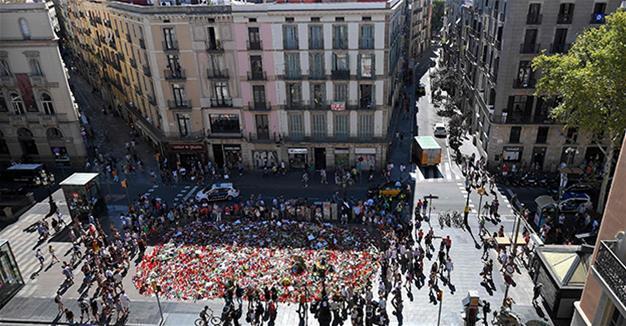Barcelona van attackers plotted major bombings, Spanish court hears
MADRID - Reuters

An Islamist militant cell that last week used a van to kill 13 people in Barcelona had planned one or several major bomb attacks, possibly against churches or monuments, one suspect told a court on Aug. 22, according to sources close to the investigation.
They said the group was led by an imam who tutored its members, mainly young Moroccans, in jihad (holy war) and told them "martyrdom is a good thing, according to the Koran," Mohamed Houli Chemlal told a Spanish High Court judge.
The cell was preparing bombs for an imam who planned to blow himself up at a Barcelona monument.
After a day-long hearing of four suspects in the plot, Judge Fernando Andreu late on Tuesday ordered Chemlal and a second defendant, Driss Oukabir, remanded on charges of membership of a terrorist group and murder. Chemlal was also charged with explosives possession.
A third suspect, Salh El Karib, who ran an internet cafe in a northeastern Spanish town where most of the alleged members of the cell lived, will remain in police custody for now pending further investigation. The fourth man, Mohamed Aalla, was released on certain conditions.
Chemlal was the only one of the four suspects who admitted a role in the plot, the sources said. The other three all denied involvement.
Police on Aug. 21 shot dead 22-year-old Younes Abouyaaqoub, whom they had identified as the driver of the van that careered along the packed Las Ramblas promenade in Barcelona last Thursday, killing 13 people and injuring 120 others from 34 countries.
Islamic State of Iraq and the Levant (ISIL) claimed responsibility for the van attack and a separate deadly assault, hours later, in the coastal resort of Cambrils, south of Barcelona.
In Cambrils, a car rammed passersby before its occupants got out and tried to stab people. The five assailants, who were wearing what turned out to be fake explosive belts, were all shot dead by police, while a Spanish woman died in the attack.
Police say the imam suspected of leading the militant cell, Abdelbaki Es Satty, died a day before the Barcelona attack when a house the group was using to build bombs blew up.
According to Judge Andreu's court order, in the ruins of the house in Alcanar, southwest of Barcelona, police found several plane tickets to Brussels in Es Satty's name issued by the Spanish airline Vueling.
Also found, it said, was a note in Arabic entitled: "Short letter from the soldiers of ISIL in the land of al-Andalus for the crusaders, the hateful, the sinners, the unjust, the corruptors."
Al-Andalus was the Islamic name for Spain during the Middle Ages when much of it was Muslim-controlled.
Chemlal told the court in the closed hearing that the group had obtained materials for making explosives in Spain, abroad and via the internet, the sources said.
Chemlal, who told the court he regretted his part in the plot, said Es Satty, the imam in Ripoll, the small town in northeastern Spain where many of the group came from, led the cell, according to the sources.
The group had planned to commit "one or several" attacks with explosives, Chemlal said. He said there was no "clear or certain target" but he referred to attacks against churches and monuments, the sources said.
El Mundo newspaper reported that architect Antoni Gaudi's landmark Sagrada Familia church in Barcelona might have been a target, but this could not be immediately confirmed.
The cell was making explosives and planned to use butane gas canisters to make a more powerful bomb, guided by tutorials found on the internet, Chemlal said.
The plan went wrong when an explosion wrecked the house where the plotters were making the bombs a day before the Barcelona attack, killing the imam and another man and leading the survivors to hurriedly change tactics.
 An Islamist militant cell that last week used a van to kill 13 people in Barcelona had planned one or several major bomb attacks, possibly against churches or monuments, one suspect told a court on Aug. 22, according to sources close to the investigation.
An Islamist militant cell that last week used a van to kill 13 people in Barcelona had planned one or several major bomb attacks, possibly against churches or monuments, one suspect told a court on Aug. 22, according to sources close to the investigation.